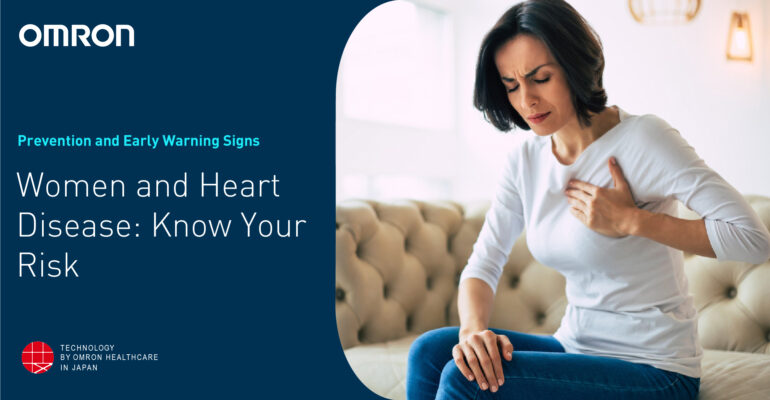Women and Heart Disease: Know Your Risk
December 3, 2022 2023-08-29 15:33Women and Heart Disease: Know Your Risk

Women and Heart Disease: Know Your Risk
Heart disease is often considered a health issue that primarily affects men. However, women are more prone than men to develop heart disease and have a higher mortality rate with heart disease. According to the American Heart Association, heart disease is the leading cause of death for women in the US, accounting for one in every three female deaths. Women must understand their risk factors and take steps to protect their heart health.[1]
The Global Burden of Disease (GBD) study found that cardiovascular disease (CVD) caused 2.64 million deaths in India, with women accounting for 1.18 million CVD deaths and men accounting for 1.45 million CVD deaths.[2]
The Importance of Knowing Your Risk:
Knowing your risk for heart disease is essential, as it allows you to make informed decisions about your lifestyle and healthcare. Many risk factors for heart disease are controllable or manageable, and early detection and intervention can help prevent or delay the onset of heart disease. Understanding your risk also means being aware of the symptoms of heart disease and seeking medical attention if you experience any of them.
The following are the most common types of heart disease in women include:
Coronary Artery Disease (CAD): CAD is the most common type of heart disease, accounting for about half of all cases. It occurs when the blood vessels that supply the heart with blood and oxygen become narrowed or blocked, leading to chest pain, shortness of breath, and fatigue. Atypical symptoms like nausea, vomiting, and jaw or back pain are more common in women than males.
Arrhythmias: A heart arrhythmia is an abnormal heart rhythm that can make the heartbeat too fast, slow or irregular. Symptoms of arrhythmias can include palpitations, dizziness, and fainting. Women are more likely to experience arrhythmias during hormonal changes such as pregnancy and menopause.
Heart Failure: Heart failure occurs when the heart can’t pump enough blood to meet the body’s needs. Heart failure symptoms include shortness of breath, fatigue, and swelling in the ankles and the legs. Women are more likely to experience heart failure with preserved ejection fraction, a type of heart failure where the heart pumps normally, but the heart muscles are stiff.[3]
Heart disease Risk Factors in Women:
Some risk factors for heart disease are common in men and women, such as high blood pressure, high cholesterol, diabetes, and obesity. However, there are also some gender-specific risk factors that women need to be aware of.
Menopause: A woman’s risk of heart disease may rise due to menopause-related hormonal changes. After menopause, women’s levels of estrogen drop, which can lead to an increase in LDL (bad) cholesterol and a decrease in HDL (good) cholesterol.
Pregnancy complications: Certain pregnancy complications, such as gestational diabetes and preeclampsia, can increase a woman’s risk of heart disease later in life.
Autoimmune diseases: Women are more likely than men to develop autoimmune diseases such as lupus and rheumatoid arthritis, which can increase the risk of heart disease.
Mental health: Depression and chronic stress can increase women’s heart disease risk.
Lifestyle factors: Smoking, a sedentary lifestyle, and poor nutrition can increase a woman’s risk of heart disease.[4]
Heart disease prevention and management methods for women:
To prevent or manage heart disease, women can follow several steps, such as:
Know your numbers: Regular check-ups with your doctor can help you monitor your blood pressure, cholesterol, and blood sugar levels.
Maintain a healthy weight: Being overweight or obese can increase the risk of heart disease. Regular exercise and a healthy diet can help you maintain a healthy weight.
Quit drinking: Smoking increases the risk of heart disease significantly. See your doctor about ways to stop smoking if you do.
Manage stress: Chronic stress can raise your risk of heart disease. Finding ways to manage stress, such as exercise or meditation, can help protect your heart health.
Seek treatment for mental health issues: Depression and anxiety can increase the risk of heart disease. Seeking treatment for these conditions can help lower your risk.
Take medication as prescribed: If you have high blood pressure, high cholesterol, or other conditions that increase your risk of heart disease, taking medication as your doctor prescribes can help manage your risk.[5]
OMRON Body Composition Monitor (BCM) and Blood Pressure Monitor are (bp machine) two devices that can help manage heart health. The BCM can measure body fat, muscle mass, and other health indicators affecting heart health. Meanwhile, the BP monitor can measure High blood pressure, a significant risk factor for heart disease. Individuals can better monitor and manage their heart health by regularly using these devices and tracking the data.
Wrap-Up:
Women must prioritize their heart health and advocate for themselves by seeking medical attention if they experience any symptoms of heart disease. With awareness, education, and action, women can reduce their heart disease risk and live healthier lives.
Reference:
- https://www.goredforwomen.org/en/about-heart-disease-in-women/facts
- https://www.ncbi.nlm.nih.gov/pmc/articles/PMC8315408/
- https://www.cdc.gov/heartdisease/women.htm
- https://www.mayoclinic.org/diseases-conditions/heart-disease/in-depth/heart-disease/art-20046167
- https://www.mayoclinic.org/diseases-conditions/heart-disease/in-depth/heart-disease-prevention/art-20046502






